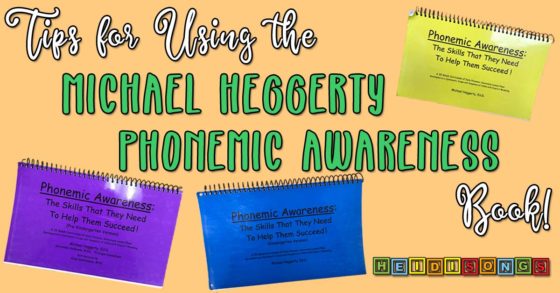HELP! My Child Keeps Failing NONFICTION AR Tests!
Have you heard the news? We've Moved to HeidiSongs.tv!
Our new website features an online video streaming service, updated blog posts at Heidisongs.blog, and a wealth of fresh resources designed to make learning even more fun and engaging.
You can also continue shopping for our educational products there and at our Teachers Pay Teachers store!
Head over to HeidiSongs.tv now and explore all the exciting new features.
See you there!
__________________________________________________________________________
In this post, I am going to share a few methods that I use to help children comprehend nonfiction print and prepare for Accelerated Reader (also known as AR) tests. These tests on informational books can be tricky, and there are few things that drive parents crazier than helping a child prepare for a test at school and then finding that he failed- AGAIN! For some kids, it seems like no matter how hard they try, they simply can't pass these comprehension tests on nonfiction books. Since I have a pretty good track record in helping children comprehend all types of books, it's possible that these techniques might also work for you! And most of my kids usually meet their AR goals, too, I'm happy to say!
By the way, I wrote a post a few years back on helping children pass fiction story book AR tests. If that's more what you are looking for, click here.
Just as a side note, I know that you may be one of many caring adults that has mixed or negative feelings about Accelerated Reader. As a teacher, I really like that I get constant feedback regarding the children's reading comprehension and reading fluency levels. And AR also holds the children firmly accountable! If a child is reading carefully, they will usually do well. If they are not reading enough, they are accountable for that because it shows up on their test scores.
However, I wish that my students' AR reading goals could be more within reach of a few that really seem to be trying their best, yet can't quite keep up. It's heartbreaking sometimes... however, I find that the longer I stay in one grade level (this is my second year in grade now), the more tricks I have up my sleeve to try, of course.
I got the idea for this post due to a comment that I recently received from a grandparent that is raising her grandson and is trying to help him. I've rewritten her email, with her permission below.
"Hello Heidi, my husband and I have guardianship of our 10 year old grandson. He is in the fourth grade and is really struggling with passing non-fiction AR books. He does well on most fiction books and is able to meet the 85% or better threshold. He has to read at least 5 non-fiction books this nine weeks. This is going to be a challenge since it will basically require him to read and test on at least two books per week. This coupled with all the other homework and studying he has to do to maintain his A-B average and his participation in karate and cub scouts, is quite taxing. The recent STARS Reading Assessment scored him at GE 6.4, an increase from 4.9 just last August. Because he scored so well, he is now expected to read “red” level books when he was having difficulty passing the 4.9 level non-fiction books. I have tried everything, including some of the strategies you suggested in your post. I am at my wits end and feeling frustrated. My grandson is also feeling frustrated. He met his AR point goals and percentage goals last nine weeks, but was excluded from the AR party because he didn’t meet the required nonfiction books (three). He was very sad. Because the children only go to the school library once a week (which is ridiculous given the expectations), I have begun taking my grandson to the public library about once a week where he can check out multiple books at a time. They have an AR section, so it makes selecting books on his level that is approved by the school pretty easy. I allow him to chose non-fiction books that seem to peak his interest, and he still fails these test. Are you aware of any sample AR tests websites where I can get an idea of the format and type of questions asked on an AR test? The only thing I can think of that I haven’t tried is to make up mock test questions for him to test on before he takes the test at school. As I have tried all other suggestions in your post, if you have come up with any new strategies that you feel might be helpful, I would greatly appreciate it. Thank you."
This is what I wrote to her in reply, with some edits. I'm going to condense a few responses to her into one response, though, to make this easier to read.
Hi, Sherry!
That is a very difficult problem! No, I do not know of any websites with sample nonfiction test questions. I’m so sorry! (Readers, I have posted some below!)
I would have him pay close attention to (memorize) whatever is in bold print, and the items that may be in the table of contents and in the glossary. Charts and graphs may also be important.
If a child is struggling with non-fiction, I often suggest that he or she bump DOWN a level for the AR books in that genre. It should not be out of the question to let him read easier nonfiction books until he gets the hang of it! In any case, the difference between a level 2.5 and a 3.5 book might be hard to spot, except that they are probably shorter. This would allow the child to reread the same material a few times before testing. Have you thought of asking the teacher if he could do that? He seems to already have a history of failing at comprehending non-fiction books, so it seems like a reasonable request.
When your child is reading a nonfiction book and wants/needs to pass an AR test on it, this is the key: The AR test will be almost as if you are taking a science or social science test. The kids are expected to not only comprehend but also practically MEMORIZE the information presented! That's what makes it so hard! It often takes students, parents, and even their teacher by surprise, because nobody expected the child to have to have memorized the specific facts presented! But that is exactly what is happening about 85%-90% of the the time, I would say. I've watched kids take many, many AR tests, both fiction and nonfiction. I often wish that the questions that are asked would be more general, but they tend to lean towards more specific facts.
I believe that the point of this is that the children are supposed to start learning how to get information from print, rather than just enjoy it. So if your child is prepping for a nonfiction AR test, he is reading to learn, not learning to read. Does that make sense?
Good luck and God bless you!
Heidi
This is the reply from the grandparent:
Heidi, Thank you for replying so quickly to my inquiry. Since your reply, my grandson has taken two non-fiction AR test and scored a 100% on both. HOORAY!!!. In your reply, when you compared taking a nonfiction test to taking a science or social science test, a light bulb went off for me. I assist my grandson with his science and social studies test by creating quizzes on the Quizlet website and it is very helpful. So, I created a quiz for the two nonfiction books he had to read and it made all the difference. I included questions from the bold print, glossary and balloons in the book. We haven't had to bump his reading level down (which his teacher was opposed to anyway) and he is feeling much better about himself. With repetition and the success he is experiencing, I am hoping he is getting the hang of it and can be able to do this on his own in the not too distant future. It is very time consuming for me, but worth it. I also have him read the book aloud to me and question him about what he's read every few pages. He reads the book at least twice before he test. Thank you for your feedback, it helped to get us on the right track. I was unable to respond to your request for a list of the books he is working on because they don't get the list ahead of time. For now, we seem to have figured out what works for him, so we'll keep at it and hopefully he will meet his AR goals for this nine weeks. Thank you again!
YAY! :)
Here is a book that we use in my second grade classroom called Life Cycle of a Silkworm.
It is a level 3.2 book (early third grade), so it is a bit challenging for many of the kids, but since we study silkworms, I help them with it and most of the kids can handle it.
Here are some sample questions from the actual AR quiz:
What happens after the silkworm egg is warmed up?
(The center turns black.)
What is the only food a silkworm larva will eat?
(Mulberry leaves.)
It takes the silkworm larva three days to:
(spin a silk cocoon.)
How does the silk moth get out of its cocoon?
(It spits a special liquid that makes a hole in the silk.)
After laying her eggs, the female moth will:
(die a few hours later.)
Here are a few other books we use:
I hope that this has been helpful! Have a great week! :)
-Heidi
----------------------------------
Follow me! Did you enjoy this post? Do me a favor and share it with your friends! And follow this blog by signing up for my email updates here, or follow on Bloglovin', or follow me on TPT! I'm also on Pinterest, Facebook, Twitter, Instagram, Google+ and YouTube, too! Don't forget to sign up for our email newsletter for special deals and promo codes that you won't find out about anywhere else.
By the way, I wrote a post a few years back on helping children pass fiction story book AR tests. If that's more what you are looking for, click here.
Just as a side note, I know that you may be one of many caring adults that has mixed or negative feelings about Accelerated Reader. As a teacher, I really like that I get constant feedback regarding the children's reading comprehension and reading fluency levels. And AR also holds the children firmly accountable! If a child is reading carefully, they will usually do well. If they are not reading enough, they are accountable for that because it shows up on their test scores.
However, I wish that my students' AR reading goals could be more within reach of a few that really seem to be trying their best, yet can't quite keep up. It's heartbreaking sometimes... however, I find that the longer I stay in one grade level (this is my second year in grade now), the more tricks I have up my sleeve to try, of course.
I got the idea for this post due to a comment that I recently received from a grandparent that is raising her grandson and is trying to help him. I've rewritten her email, with her permission below.
This is what I wrote to her in reply, with some edits. I'm going to condense a few responses to her into one response, though, to make this easier to read.
Hi, Sherry!
That is a very difficult problem! No, I do not know of any websites with sample nonfiction test questions. I’m so sorry! (Readers, I have posted some below!)
I would have him pay close attention to (memorize) whatever is in bold print, and the items that may be in the table of contents and in the glossary. Charts and graphs may also be important.
If a child is struggling with non-fiction, I often suggest that he or she bump DOWN a level for the AR books in that genre. It should not be out of the question to let him read easier nonfiction books until he gets the hang of it! In any case, the difference between a level 2.5 and a 3.5 book might be hard to spot, except that they are probably shorter. This would allow the child to reread the same material a few times before testing. Have you thought of asking the teacher if he could do that? He seems to already have a history of failing at comprehending non-fiction books, so it seems like a reasonable request.
When your child is reading a nonfiction book and wants/needs to pass an AR test on it, this is the key: The AR test will be almost as if you are taking a science or social science test. The kids are expected to not only comprehend but also practically MEMORIZE the information presented! That's what makes it so hard! It often takes students, parents, and even their teacher by surprise, because nobody expected the child to have to have memorized the specific facts presented! But that is exactly what is happening about 85%-90% of the the time, I would say. I've watched kids take many, many AR tests, both fiction and nonfiction. I often wish that the questions that are asked would be more general, but they tend to lean towards more specific facts.
I believe that the point of this is that the children are supposed to start learning how to get information from print, rather than just enjoy it. So if your child is prepping for a nonfiction AR test, he is reading to learn, not learning to read. Does that make sense?
Good luck and God bless you!
Heidi
This is the reply from the grandparent:
YAY! :)
Here is a book that we use in my second grade classroom called Life Cycle of a Silkworm.
It is a level 3.2 book (early third grade), so it is a bit challenging for many of the kids, but since we study silkworms, I help them with it and most of the kids can handle it.
Here are some sample questions from the actual AR quiz:
What happens after the silkworm egg is warmed up?
(The center turns black.)
What is the only food a silkworm larva will eat?
(Mulberry leaves.)
It takes the silkworm larva three days to:
(spin a silk cocoon.)
How does the silk moth get out of its cocoon?
(It spits a special liquid that makes a hole in the silk.)
After laying her eggs, the female moth will:
(die a few hours later.)
Here are a few other books we use:
I hope that this has been helpful! Have a great week! :)
-Heidi
----------------------------------
Follow me! Did you enjoy this post? Do me a favor and share it with your friends! And follow this blog by signing up for my email updates here, or follow on Bloglovin', or follow me on TPT! I'm also on Pinterest, Facebook, Twitter, Instagram, Google+ and YouTube, too! Don't forget to sign up for our email newsletter for special deals and promo codes that you won't find out about anywhere else.


















